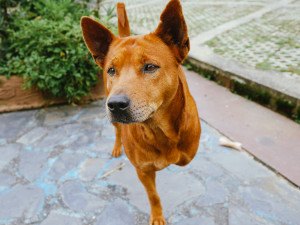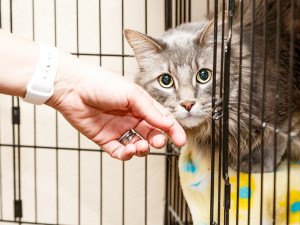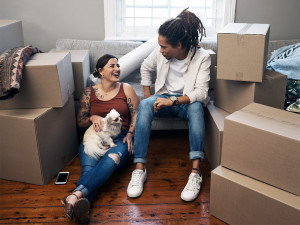Is It More Ethical to Adopt a Dog From Overseas Or From the UK?
You’ve chosen to adopt a dog, congratulations! But with dogs in need both here and abroad, which route should you take?
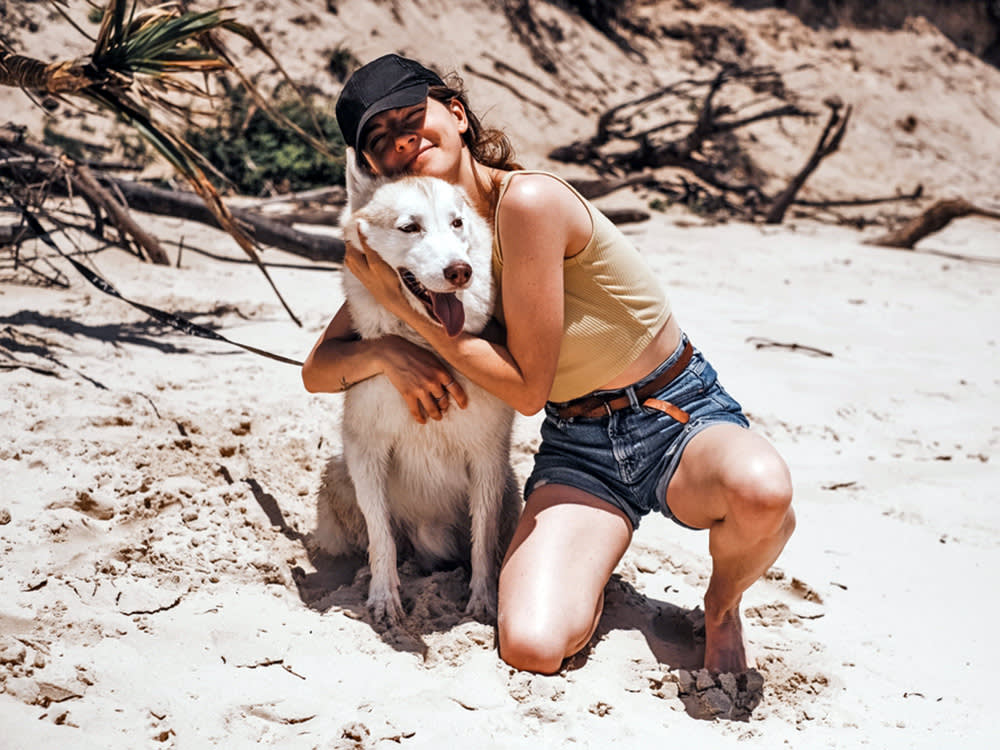
share article
If you’ve made the decision to adopt a dog, that’s incredible! You’re one step closer to kicking off a big and rewarding chapter in your life. But figuring out where to adopt them from is the next big question. Obviously, you want to help the dogs most in need, but with so many animals up for adoption at home and abroad, figuring out where that is isn’t exactly clear cut.
There’s been a surge in recent years of people in the UK adopting dogs from overseas. According to the Department for Food, Environment and Rural Affairsopens in a new tab, the number of dogs, cats and ferrets imported commercially into the UK increased from 45,129 in 2018 to 73,730 in 2020. A whopping 66,952 of these animals were dogs. Data from the PDSA Animal Wellbeing Report 2023opens in a new tab reveals that in August 2020, dogs from overseas made up 4 percent of the UK dog population, rising to six percent in 2021 and 2022, and eight percent in 2023. This means there are currently around one million dogs from other countries residing in the UK.
At the same time, animal shelters in the UK are in dire straits thanks to the cost of living crisis – the latest figures from Dogs Trustopens in a new tab reveal that in 2022 alone they had 7,875 dogs handed over to them by owners who could no longer look after them. The same year, the RSPCA announced a six percent rise in dogs being surrendered to themopens in a new tab (compared to pre-pandemic 2019 figures), and a 30 percent drop in adoptions.
Why are people adopting dogs from overseas when there are so many in need at home?
It’s a dilemma that charities themselves face. Janey Lowes is a veterinary surgeon and founder of WECare Worldwideopens in a new tab, a street dog veterinary charity based on the south coast of Sri Lanka.
“I’ve worked in Sri Lanka for 10 years now, and have always been a strong believer in rehoming Sri Lankan dogs within Sri Lanka itself,” she says. “Every country has an unowned dog issue, whether it’s out there on the street or behind shelter doors, and I was adamant that we wouldn’t add to the problems of other countries.
“However, last year, during Sri Lanka’s economic crisis, when we couldn’t get hold of essential supplies, it became abundantly clear that we were unable to provide a quality of life for our resident dogs that they deserve. Some had been with us for over seven years – despite many adoption attempts – so we decided to explore overseas options.
“Our trial run of five dogs resulted in successful adoptions, so it’s now very difficult to not see this as a viable option. However, we will only ever do this when all other avenues in Sri Lanka have been exhausted.”
On the flip side, 4 PAWS Rescue & Relocation Internationalopens in a new tab is an animal welfare charity in Mauritius that used to fly around 100 dogs a year to the UK for adoption. However, in 2022, due to the overwhelming UK shelter crisis, founder Lisa Kendrick and her on-the-ground coordinator Barbara Elkaz made the decision to stop actively relocating dogs. Instead, they now concentrate on their catch-neuter-release projectopens in a new tab, only arranging adoptions for tourists who have met a dog they want to fly home.
Why is it often harder to adopt from UK-based shelters?
Of 3,080 people surveyed in a 2020 study published in The Veterinary Recordopens in a new tab, 13 percent said they adopted from overseas as UK shelters refused them a dog due to requirements about time spent at home, and eight percent because of strict criteria about young children. When we spoke to people who had adopted dogs from abroad, many said it was because they had been rejected by organisations at home.
Kaz Barlow applied to a number of UK shelters, but was declined for reasons she can’t understand. “I have fibromyalgia, and was told I might be unable to manage a dog due to my health,” she says. “However, I’d explained to them that my sister would walk, feed and care for the dog if need be. I was also rejected as I occasionally have children under the age of 10 who visit my home.” Kaz ended up adopting a Romanian stray called Pixi, who she was matched with via Help for Dogsopens in a new tab. “I would have loved to adopt from the UK, but charities made it so difficult to do so.”
We approached Dogs Trust for its response to people’s frustration with adopting from within the UK. “The rehoming requirements of each dog in our care are considered on a case-by-case basis, as every dog in our care has specific needs,” advises a Dogs Trust spokesperson. “We rehome to all different types of homes, from houses and flats to narrow boats, with and without gardens. Some of our dogs can be rehomed with younger children, while others need adult-only homes.
“Some of our dogs may receive lots of interest, particularly puppies and popular breeds, which means that potential adopters can be left disappointed, and the process can take a little longer than expected.
“Last year, we found new homes for over 10,500 dogs.”
The RSPCAopens in a new tab has a similar stance. “Our teams spend a lot of time getting to know our dogs, having them assessed by vets and behaviourists, and establishing exactly what type of home will best suit their needs,” an RSPCA spokesperson tells us. “This means that some dogs may not be suitable for families with children or may have specific needs, such as a rural home, or a home with no other pets.”
Are dogs from overseas more in need?
Overseas charities tend to be based in countries that have feral dog populations or poor animal welfare. It’s for this reason that many people choose to adopt from abroad – 39 percent of those surveyed said they did so as they perceived these dogs to have suffered more than their UK counterparts.
Deb Donns is a rehomer who works with shelters in both the UK and Romania, so she’s seen firsthand the struggles that overseas dogs face.
“There are many sanctuaries in Romania, but the sheer number of animals means they have to be kennelled outdoors,” she says. “This is lovely in summer, but sheer hell in the harsh winter. UK shelters are superior in terms of facilities and condition, but they simply cannot match it in Romania because they’re unable to raise the funding.”
Do dogs from other countries behave differently to dogs from the UK?
Like us humans, dogs have unique quirks and personalities, though there are some patterns in how dogs from overseas might behave differently to those from the UK.
“I’ve noticed that overseas dogs seem to be a lot more timid, noise sensitive and reactive to cars and children than the UK rescues, although this can vary,” explains dog behaviourist Mary Williams, who is registered with the Pet Professional Guildopens in a new tab and has years of experience working with both UK and overseas rescues. She also says that the overseas dogs she’s worked with appear to be more afraid of men, perhaps due to previous treatment in their country of origin.
“Adopters often don’t understand the challenges that overseas dogs have faced, and they expect them to adapt quickly, becoming frustrated if they don’t. It’s important to note that former street dogs have better dog language than UK dogs – if they react when on a walk, they’re communicating that they’re not happy, but owners may wrongly interpret this as aggression.”
The risks of adopting a dog you’ve never met
UK shelters like Dogs Trust, RSPCA and Battersea require you to meet a dog in the flesh before committing to adopt – with good reason. A Dogs Trust spokesperson told us that it allows them to assess compatibility, and gives future owners a chance to build a bond before committing, which is more likely to result in a successful adoption.
Most people adopting from abroad won’t have met their new animal before committing to them, with many initially choosing a dog based on appearance. So what happens if it’s a disastrous match for all concerned? Many overseas charities offer behavioural aftercare and have UK foster homes for worst-case scenarios. However, if a charity doesn’t have this in place, there’s a risk that the dog could end up in a UK shelter if things don’t work out.
Then there’s the issue of home checks. Lots of overseas charities have UK-based volunteers who perform essential in-person home checks on prospective adopters. However, some adopters we spoke to had their homes approved via video call or message. Is this an adequate assessment?
Susan Quirke is a home checker for a number of overseas charities, and is dubious about this method: “We’re told to check every room to make sure they aren’t running a puppy farm, but when it’s online, you only have their word for anything. How do you even know it’s their home?”
Of course, you may encounter issues with any rescue, regardless of where they come from.
Whether you choose to adopt from the UK or abroad, it’s important to work with the shelter to find the right match for your circumstances, ensure they pass all health requirements, and consider if you have the time and money to work on any potential issues that may arise.
So, should you adopt from overseas or the UK?
This decision is entirely down to you and what feels best for your individual situation. If you plan to adopt a dog from the UK, be prepared that it can be a lengthy process if a shelter’s policy is to pair candidates with suitable dogs, rather than let you choose one. However, remember that this system is designed to make the best possible match! Make the most of any time given to bond with your prospective dog, and don’t hesitate to raise any issues, no matter how silly they might seem.
When adopting from overseas, thoroughly research the organisation and if possible, reach out to people who have previously adopted from them. Don’t be afraid to ask loads of questions, as a legitimate organisation will be happy to answer them. Find out what the charity’s aftercare policy is – do they provide behavioural support? Are there staff/volunteers on the ground in the UK? What’s the protocol for the worst-case scenario of you needing to give up the dog? You should also ensure the animal has been tested and vaccinated for any relevant diseases, like rabies, heartworm and leishmania.
At the end of the day, wherever you adopt your furry friend from, the main concern is that you have the time and resources to settle them in and provide them with the happy, healthy forever home that they deserve.
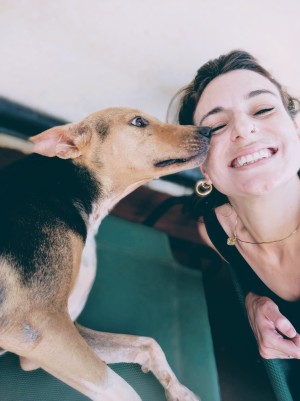
Lisa Bowman
Lisa is a writer whose work has been featured in the likes of Stylist, Metro and The Guardian. She spends her days at a computer so she can bankroll her two rescue dogs, who may or may not be The Cutest Dogs in the World.
Related articles
![A hand reaching towards a cat peaking out of a cage.]() opens in a new tab
opens in a new tab10 Questions to Ask a Rescue Centre About an Adoptable Cat
From medical history to adoption fees to litter preferences, here’s everything you need to know
![a nervous dog sits on a sofa]() opens in a new tab
opens in a new tabBringing Home A Very Nervous Rescue Dog – A Guide For Anxious Parents
At so many points in those first hours, weeks, months, I screamed, internally: what have we done?
![a woman and a man sit in an empty home surrounded by boxes with a dog]() opens in a new tab
opens in a new tabMoving Abroad With Your Dog? Here’s Everything You Need To Know
Moving house is stressful at the best of times, but what happens if you want to move abroad with your dog? We consulted some experts to find out
![Blonde woman with hand tattoo kissing her gray kitten]() opens in a new tab
opens in a new tabA Step-by-Step Guide to Adopting a Cat
From where to begin looking to how to prepare your home for the new arrival
